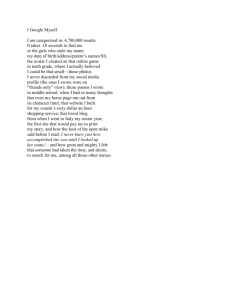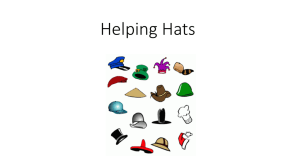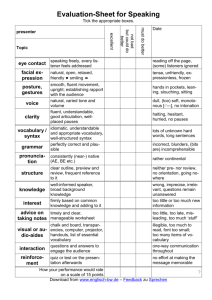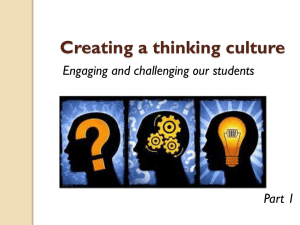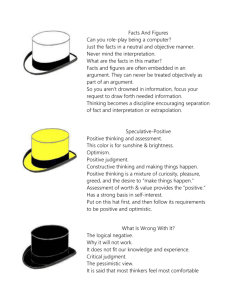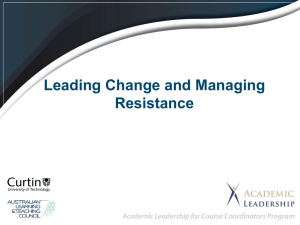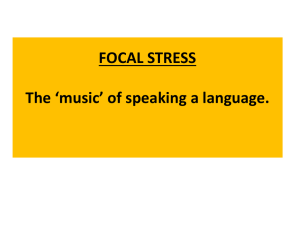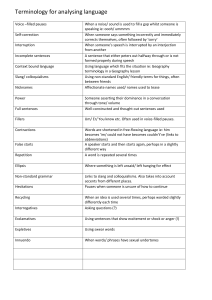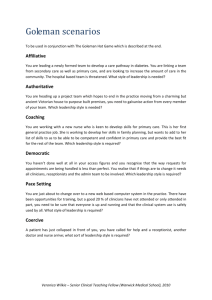Stress and Pauses - University of Hawaii
advertisement
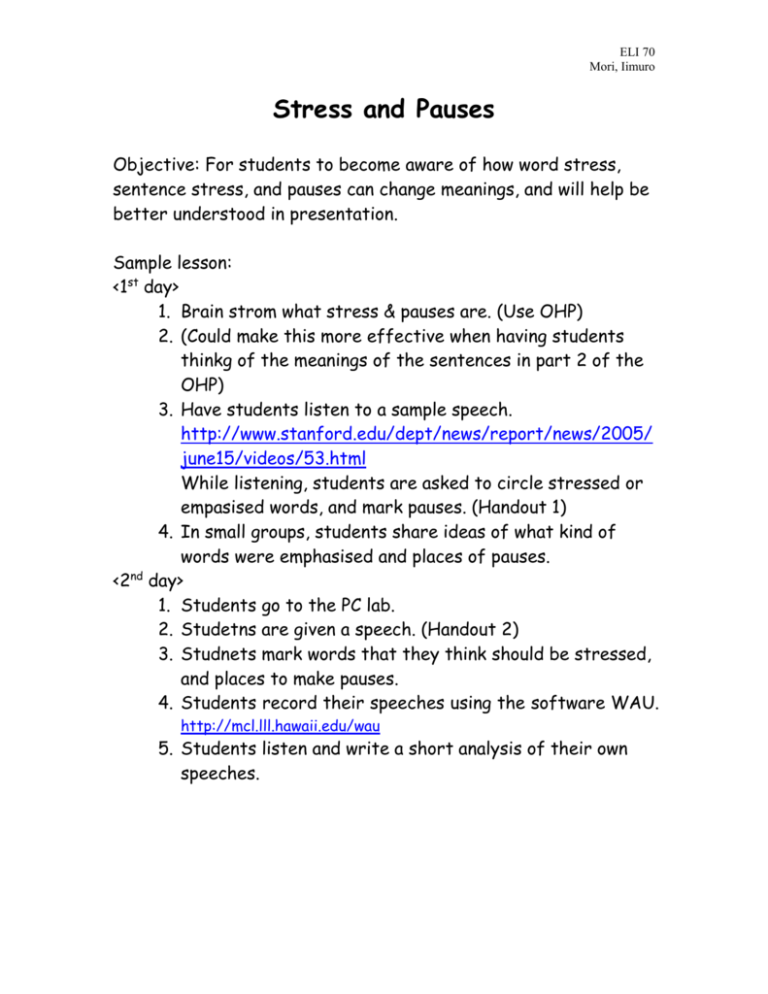
ELI 70 Mori, Iimuro Stress and Pauses Objective: For students to become aware of how word stress, sentence stress, and pauses can change meanings, and will help be better understood in presentation. Sample lesson: <1st day> 1. Brain strom what stress & pauses are. (Use OHP) 2. (Could make this more effective when having students thinkg of the meanings of the sentences in part 2 of the OHP) 3. Have students listen to a sample speech. http://www.stanford.edu/dept/news/report/news/2005/ june15/videos/53.html While listening, students are asked to circle stressed or empasised words, and mark pauses. (Handout 1) 4. In small groups, students share ideas of what kind of words were emphasised and places of pauses. nd <2 day> 1. Students go to the PC lab. 2. Studetns are given a speech. (Handout 2) 3. Studnets mark words that they think should be stressed, and places to make pauses. 4. Students record their speeches using the software WAU. http://mcl.lll.hawaii.edu/wau 5. Students listen and write a short analysis of their own speeches. ELI 70 Mori, Iimuro OHP Stress, Intonation, & Pitch 1. Word stress ► In English, each word has only ONE STRESSD syllable on a vowel that is pronounced stronger than the others. e.g. PHOtograph, phoTOgrapher, photoGRAPHic TEACHer, JaPAN, CHINa, aBOVE, converSAtion, INteresting, imPORtant, deMAND, etCETera, etCETera, etCETera 2. Sentence stress (Intonation) ► Stressed words in a sentence “signal” important point in the message → listening key! ► It can convey certain meanings or contrast information. e.g. I did not say you stole my red hat. 1. 2. 3. 4. 5. 6. 7. 8. I did not say you stole my red hat. (But somebody else did.) I did not (didn’t) say you stole my red hat. (Strong resentment to answer a question.) I did not say you stole my red hat. (Strong anger and denial of the fact.) I did not say you stole my red hat. I did not say you stole my red hat I did not say you stole my red hat I did not say you stole my red hat I did not say you stole my red hat. 9. I did not say that you stole my red hat. A) Content words (carries meaning; stressed) Nouns (kitchen, Peter, Africa) (most) principal verbs (manage, visit, construct) Adjectives (beautiful, interesting) Adverbs (often, carefully) B) Function words (doesn’t carry meaning by itself; unstressed) Determiners (the, a, some, a few) Auxiliary verbs (don't, am, can, were) Prepositions (before, next to, opposite) Conjunctions (but, while, as) Pronouns (they, she, us) ELI 70 Mori, Iimuro C) Purposes: 1. Statement (Dogs eat bones.) 2. First half, second half (Dogs eat bones, but cats eat fish.) 3. Intro phrase (As we all know, dogs eat bones.) 4. Listing (Dogs eat bones, kibbles and meat.) 5. Question (Do dogs eat bones?) 6. Repeated question (Do dogs eat bones?) American accent training - http://www.americanaccent.com/intonation.html 3. Pitch Very high (e.g. strong emotion, excitement, etc.) High Average (neutral) Low From POW tutorial - http://www.eptotd.btinternet.co.uk/pow/powtut3-1.htm ELI 70 Mori, Iimuro Handout 1 Directions: This is the text of the Commencement address by Steve Jobs, CEO of Apple Computer and of Pixar Animation Studios, delivered on June 12, 2005 at Stanford University. While listening to the speech, 1. Circle the words that you hear emphasized. 2. Put “/” where there is a short pause. 3. Put “//” where there is a long pause. The first paragraph is done for you. --------------------------------------------------------------------------------------------------------------------I am honored to be with you today at your commencement from one of the finest universities in the world. // Truth be told,/ I never graduated from college,/ and this is the closest I've ever gotten to a college graduation.// Today /I want to tell you three stories from my life.// That's it. // No big deal. // Just three stories.// The first story is about connecting the dots. I dropped out of Reed College after the first 6 months, but then stayed around as a drop-in for another 18 months or so before I really quit. So why did I drop out? It started before I was born. My biological mother was a young, unwed college graduate student, and she decided to put me up for adoption. She felt very strongly that I should be adopted by college graduates, so everything was all set for me to be adopted at birth by a lawyer and his wife. Except that when I popped out they decided at the last minute that they really wanted a girl. So my parents, who were on a waiting list, got a call in the middle of the night asking: "We have an unexpected baby boy; do you want him?" They said: "Of course." My biological mother later found out later that my mother had never graduated from college and that my father had never graduated from high school. She refused to sign the final adoption papers. She only relented a few months later when my parents promised that I would go to college. This was the start in my life. And 17 years later I did go to college. But I naively chose a college that was almost as expensive as Stanford, and all of my working-class parents' savings were being spent on my college tuition. After six months, I couldn't see the value in it. I had no idea what I wanted to do with my life and no idea how college was going to help me figure it out. And here I was spending all of the money my parents had saved their entire life. So I decided to drop out and trust that it would all work out OK. It was pretty ELI 70 Mori, Iimuro scary at the time, but looking back it was one of the best decisions I ever made. The minute I dropped out I could stop taking the required classes that didn't interest me, and begin dropping in on the ones that looked far more interesting. It wasn't all romantic. I didn't have a dorm room, so I slept on the floor in friends' rooms, I returned coke bottles for the 5¢ deposits to buy food with, and I would walk the 7 miles across town every Sunday night to get one good meal a week at the Hare Krishna temple. I loved it. And much of what I stumbled into by following my curiosity and intuition turned out to be priceless later on. Let me give you one example: Reed College at that time offered perhaps the best calligraphy instruction in the country. Throughout the campus every poster, every label on every drawer, was beautifully hand calligraphed. Because I had dropped out and didn't have to take the normal classes, I decided to take a calligraphy class to learn how to do this. I learned about serif and san serif typefaces, about varying the amount of space between different letter combinations, about what makes great typography great. It was beautiful, historical, artistically subtle in a way that science can't capture, and I found it fascinating. None of this had even a hope of any practical application in my life. But ten years later, when we were designing the first Macintosh computer, it all came back to me. And we designed it all into the Mac. It was the first computer with beautiful typography. If I had never dropped in on that single course in college, the Mac would have never had multiple typefaces or proportionally spaced fonts. And since Windows just copied the Mac, its likely that no personal computer would have them. If I had never dropped out, I would have never dropped in on this calligraphy class, and personal computers might not have the wonderful typography that they do. Of course it was impossible to connect the dots looking forward when I was in college. But it was very, very clear looking backwards ten years later. Again, you can't connect the dots looking forward; you can only connect them looking backwards. So you have to trust that the dots will somehow connect in your future. You have to trust in something — your gut, destiny, life, karma, whatever. Because believing that the dots will connect down the road, will give you the confidence to follow your heart, even when it leads you off the well-worn path, and that will make all the difference. ELI 70 Mori, Iimuro Handout 2 Situation: Your are a member of a nonprofit group that educates the public about the environment. A local radio stations has donated their broadcast time to your organization. Your were selected to make a 2 minute announcement in a series of short a public service broadcast. Directions: 1. With a partner, think of the words that you want to emphasize and places that you would make pauses in your announcement. If any vocabulary are new to you, look it up in the dictionary and check how to pronounce and where to put the stress in the word. 2. Circle the words that you would emphasize, and put a “/”(short pause) or “//” (long pause) in places you would make pauses. When you’re done, practice with a partner. 3. Record your speech on WAU. Try to read naturally as possible. (PC lab: Oct 25) 4. Analyze your speech. Here are some questions that may help you start: Were you able to do what you wanted to do? How does you speech differ from the model speech? What was difficult for you? What can you change? (e.g. “th” sound, (Due: Oct 30, 1/2 page, double space, 1 inch margins) Good evening, everyone.// Many people believe that our planet faces serious threats and that we need to take immediate steps to save it. Here are two most serious environmental problems and some things individuals can do to improve the situation. Scientists are expressing concern about damage to the ozone layer caused by human-made gases escaping into the atmosphere. The hole in the ozone has already resulted in increased rates of skin cancer from exposure to harmful rays of the sun. What can we do? We can reduce the use of air-conditioners, plastic foam products like Styrofoam cups, and avoid using aerosol spray cans. Scientists are also expressing concern about the greenhouse effect, the gradual warming of the earth from the gases like carbon dioxide. The increase in temperatures would cause glaciers to melt and sea level to rise. What can we do? We can buy fuel-efficient cars, energy-efficient electronic products, and set heating at a lower temperature. This is our first announcement in our series called “What on Earth Can We Do?” Please help us save the earth. If you have any comments please call us at 555-2000.
